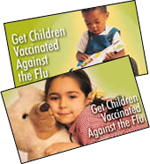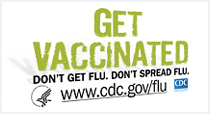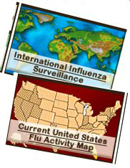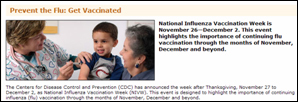eHealth Activities
eHealth Activities for Seasonal Influenza Vaccination 2007-2008 Flu Season
(Updated July 31, 2008)
In support of CDC’s National Center for Immunization and Respiratory Diseases (NCIRD) annual Seasonal Flu Vaccination campaign, the National Center for Health Marketing (NCHM) initiated a variety of eHealth activities to motivate people to Get Vaccinated! Many of the flu activities were launched during last year's National Influenza Vaccination Week (November 26 – December 2) and continued through January, 2008.
Blogs CDC hosted a webinar for “mommy bloggers” and “daddies” too! CDC health communication specialists and seasonal flu subject matter experts met online with seven bloggers, resulting in posts to six different blogs, to discuss basic information on seasonal flu and share research on key messages that have been proven to motivate people to get vaccinated. CDC educated and empowered mommy bloggers to “spread the word, not the flu.” Comments were posted to blogs including one ranked in the top 500 blogs.
CDC hosted a webinar for “mommy bloggers” and “daddies” too! CDC health communication specialists and seasonal flu subject matter experts met online with seven bloggers, resulting in posts to six different blogs, to discuss basic information on seasonal flu and share research on key messages that have been proven to motivate people to get vaccinated. CDC educated and empowered mommy bloggers to “spread the word, not the flu.” Comments were posted to blogs including one ranked in the top 500 blogs.
 Health e-Cards
Health e-Cards
CDC.gov users encouraged their friends, family, co-workers, and public health partners to get vaccinated by sending one of seven new seasonal flu Health-e-Cards created for this flu season. Users shared facts about seasonal flu and encouraged those they care about to get a flu vaccination. During the 2007-2008 flu season, of the more than 800 seasonal flu cards sent, the Flu Prevention for Health Professionals e-Card was the most popular and more than 500 were sent. Both English and Spanish versions of the CDC Flu Health e-Cards are available at www.cdc.gov/ecards.
Online Collaborations
- Focus on Low-Income Audiences
 CDC partnered with One Economy Corporation to provide critical seasonal flu vaccination messages on the One Economy Web site, http://beehive.org. One Economy Corporation is a nonprofit organization dedicated to using technology to meet the needs and potential of low-income audiences. A link to CDC’s seasonal flu fact sheet and additional seasonal flu resources is available in English. The Spanish language version can be accessed through a link at top of page.
CDC partnered with One Economy Corporation to provide critical seasonal flu vaccination messages on the One Economy Web site, http://beehive.org. One Economy Corporation is a nonprofit organization dedicated to using technology to meet the needs and potential of low-income audiences. A link to CDC’s seasonal flu fact sheet and additional seasonal flu resources is available in English. The Spanish language version can be accessed through a link at top of page.
- Graphical Buttons for Web Sites
 CDC invited online partners, including government agencies, state and local health departments, and other Web partners, to add the "Get Vaccinated" graphical button to their Web sites, email signatures, and blogs. The “Get Vaccinated” button links to CDC’s seasonal flu Web site. CDC also added the flu button to CDC.gov pages, CDC’s Second Life space, and other CDC-managed Web space. “Click- throughs,” the measure of online users who link to CDC’s flu page by selecting the flu button, topped 30,000 for internal users and nearly 4,000 for external visitors to the CDC pages, between November 1, 2007 and January 11, 2008. Instructions for adding the image to a Web site are available.
CDC invited online partners, including government agencies, state and local health departments, and other Web partners, to add the "Get Vaccinated" graphical button to their Web sites, email signatures, and blogs. The “Get Vaccinated” button links to CDC’s seasonal flu Web site. CDC also added the flu button to CDC.gov pages, CDC’s Second Life space, and other CDC-managed Web space. “Click- throughs,” the measure of online users who link to CDC’s flu page by selecting the flu button, topped 30,000 for internal users and nearly 4,000 for external visitors to the CDC pages, between November 1, 2007 and January 11, 2008. Instructions for adding the image to a Web site are available.
- Badges for Sharing on Social Networks
CDC’s eHealth team developed a seasonal flu “badge” for members of social networks to add to their profiles pages. For the first time, CDC encouraged users to share the “I Got Vaccinated” message with their friends, families, and online network “friends” and members. MySpace users were able to cut and paste the graphical badge from CDC’s MySpace profile and place it on their own MySpace or other social network profiles: http://www.myspace.com/cdc_ehealth The seasonal flu badge was successfully added to several members pages further expanding the reach of the health message to get vaccinated and avoid the seasonal flu.

Widgets
 CDC’s eHealth began piloting the first of CDC.gov’s widgets, small tools that allow users to obtain an automatic CDC Seasonal Flu update as part of their personal homepage. Each widget contains information related to a specific CDC.gov topic – in this case, seasonal flu – and enables users to perform interactive functions within the tool. The CDC.gov Seasonal Flu widgets were used to syndicate content to other Web sites, such as blogs, state and local health department Web sites, and other Web sites that chose to participate in the 2007–2008 seasonal flu vaccination campaign. Through this mechanism, CDC.gov content was presented on partners’ Web sites. Widgets are available at http://www.cdc.gov/widgets
CDC’s eHealth began piloting the first of CDC.gov’s widgets, small tools that allow users to obtain an automatic CDC Seasonal Flu update as part of their personal homepage. Each widget contains information related to a specific CDC.gov topic – in this case, seasonal flu – and enables users to perform interactive functions within the tool. The CDC.gov Seasonal Flu widgets were used to syndicate content to other Web sites, such as blogs, state and local health department Web sites, and other Web sites that chose to participate in the 2007–2008 seasonal flu vaccination campaign. Through this mechanism, CDC.gov content was presented on partners’ Web sites. Widgets are available at http://www.cdc.gov/widgets
Podcasts and Vodcasts
 CDC.gov and iTunes users could watch or listen to audio or video podcasts about seasonal influenza vaccination manufacturing and production -- and share it with their friends. During the 2007-08 seasonal flu season, more than 3,000 users downloaded podcasts about flu and another 3,000 downloaded vodcasts (video podcasts).
CDC.gov and iTunes users could watch or listen to audio or video podcasts about seasonal influenza vaccination manufacturing and production -- and share it with their friends. During the 2007-08 seasonal flu season, more than 3,000 users downloaded podcasts about flu and another 3,000 downloaded vodcasts (video podcasts).
Email Updates and Mobile Alerts
Visitors to the CDC.gov Web site were able to sign up to receive email updates or alerts sent directly to their mobile phone whenever CDC.gov’s seasonal flu content was updated: http://www.cdc.gov/flu/updates.htm. From October 2007 through January 2008 nearly 1,500 emails with updated seasonal flu information were sent out by CDC to subscribers.
 Seasonal Flu Activity Map
Seasonal Flu Activity Map
CDC’s seasonal flu activity map, an important element of CDC’s weekly flu report, was upgraded to provide easier access and presentation of information. The link to the map is prominently placed on CDC’s seasonal flu Web site and, once at the Flu Surveillance and Activity page, users can scroll through each week of flu activity and view maps illustrating national and international changes in flu activity. The maps are updated regularly during flu season. From October 2007 into January 2008, the Seasonal Flu Activity Map was viewed nearly 350,000 times by visitors to the CDC Web site.
CDC.gov "Keyword" Marketing
NCHM/eHealth piloted “keyword” marketing on the CDC.gov search engine. CDC.gov users who searched for “flu,” “influenza,” or any of several other selected keywords received the “Get Vaccinated” promotional messages on their search results page. This was the inaugural trial using keyword tracking in CDC.gov’s strategy to proactively reach out with timely health messages linked to search requests. Preliminary results are being analyzed in order to assess the impact and effectiveness of this strategy. Results will be reviewed to plan for the use of keyword marketing in the future.
 CDC.gov Home Page Feature
CDC.gov Home Page Feature
In collaboration with NCIRD, a feature article was posted on the CDC.gov Home page to alert visitors about the importance of getting vaccinated. Written for a consumer audience, the article, Prevent the Flu: Get Vaccinated, provided basic information about the flu, who should get vaccinated, the symptoms and complications of flu, and how flu is spread.
Photo/Image Sharing
Seasonal flu photographs and images from CDC’s Public Health Image Library (PHIL) were added to the popular photo sharing Web site, Flickr.com, to enable more public health partners and general consumers to access and use CDC’s scientific images related to seasonal flu. http://www.flickr.com/photos/cdc_e-health/
 Virtual Worlds and eGames
Virtual Worlds and eGames
For the second year, CDC partnered with Whyville, a popular virtual world for “tweens,” children ages 8 – 11, to promote seasonal flu vaccinations. Whyville kids invited their grandparents to a special “in-world” party on November 29, 2007. Nearly 400 Whyville kids attended the party. Gamers of all generations were virtually vaccinated together, talked online with a CDC influenza expert. Overall, more than 41,000 Whyvillians were virtually vaccinated during the 2007 campaign from November 2007 until mid-January 2008. Virtual vaccinations included 1,800 grandparents invited by their Whyvillian grandchildren to participate.
For more information about CDC's Seasonal Flu eHealth efforts, contact Erin Edgerton at eedgerton@cdc.gov or 404-498-2237.
Page last modified on July 31, 2008